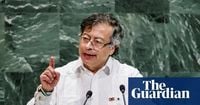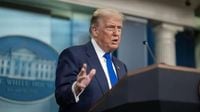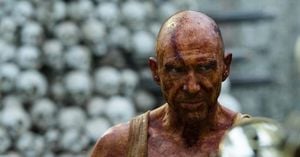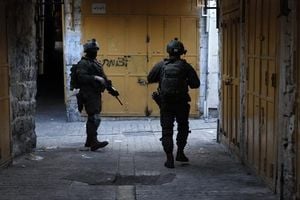In a dramatic turn at the United Nations General Assembly on September 23, 2025, Colombian President Gustavo Petro issued a forceful call for a criminal investigation against U.S. President Donald Trump and other American officials, citing deadly U.S. military strikes on boats in the Caribbean earlier that month. The strikes, which the White House confirmed were part of an anti-drug operation, resulted in the deaths of more than a dozen people—many of whom, according to Petro, were unarmed and simply trying to escape poverty.
Petro’s speech, delivered in New York, was anything but routine. Addressing world leaders, he did not mince words: “A criminal process must be initiated against those officials who are from the United States. This includes the senior official who gave the order, President Trump,” Petro declared, as reported by AFP. His remarks underscored growing international concern over the U.S. approach to combating drug trafficking in Latin America, especially when civilian lives are at stake.
The strikes in question targeted at least three boats in the southern Caribbean, off the coast of Venezuela. According to AP, these attacks were carried out between early and mid-September, with one particularly deadly strike occurring on September 19. U.S. officials claimed the vessels were transporting drugs, but the aftermath was grim: over a dozen people killed, including, Petro suspects, some Colombian nationals. United Nations experts have described the attacks as “extrajudicial executions,” raising the stakes for accountability on the international stage.
Petro, Colombia’s first leftist president and the leader of the world’s largest cocaine-producing nation, argued that the U.S. had criminalized poverty and migration with these actions. “Young people who simply wanted to escape poverty” were among the victims, he said, challenging the narrative that everyone on board was a trafficker or criminal. “Unarmed poor young people died in the strikes that Washington said were part of a U.S. anti-drug operation,” Petro emphasized, as cited by The Straits Times.
Meanwhile, President Trump remained defiant. Addressing the same General Assembly just hours earlier, he doubled down on his administration’s hardline stance against drug smuggling. “To every terrorist thug smuggling poisonous drugs into the United States of America, please be warned that we will blow you out of existence,” Trump warned, his words echoing across the assembly hall and reverberating throughout Latin America. The White House has maintained that the strikes were both legal and necessary, part of a broader campaign to stem the flow of narcotics into the United States.
The U.S. military’s show of force in the region has been unprecedented in recent years. Trump ordered the deployment of eight warships and a submarine to the southern Caribbean, marking the largest American naval presence there in decades. According to AFP, this escalation has sparked widespread fear in Venezuela, where President Nicolás Maduro has accused Trump of plotting regime change—a charge that carries echoes of past U.S. interventions in the region. Thousands of Venezuelans, heeding Maduro’s call, have joined civilian militias to bolster the country’s defenses against what they perceive as an imminent threat.
The diplomatic fallout has been swift and severe. Just last week, the Trump administration decertified Colombia as an ally in the fight against drugs—a stunning rebuke to a country that has historically been one of Washington’s closest partners in the region. While the move stopped short of imposing economic sanctions, it sent a clear signal that relations between the two nations had soured under Petro’s leadership. As AFP notes, the alliance has frayed as Petro has taken a more critical stance toward U.S. policies, particularly those that, in his view, fail to address the root causes of drug trafficking and migration.
Petro’s accusations at the UN went beyond the immediate tragedy of the strikes. He argued that the U.S. approach to the drug war disproportionately targets the poor while leaving many cartel leaders untouched. “Young people who simply wanted to escape poverty” were targeted, he said, while “many cartel bosses live in the United States.” Petro’s rhetoric reflects a broader frustration among Latin American leaders, who have long argued that U.S. anti-drug operations often have devastating consequences for their populations without addressing demand or corruption within the United States itself.
The international community has taken note. UN experts, after reviewing the deadly incidents, described them as “extrajudicial execution,” a term that carries serious legal implications under international law. Human rights organizations have echoed these concerns, warning that such actions, if left unchecked, could set a dangerous precedent for military interventions under the guise of drug enforcement.
In Venezuela, the sense of crisis is palpable. President Maduro, who survived a U.S.-backed attempt to expedite his ouster during Trump’s first term, has seized on the strikes as evidence of American aggression. He has framed the U.S. naval buildup as an existential threat to his regime, rallying supporters and urging vigilance against what he calls imperialist plots. The Venezuelan government’s response has been to mobilize thousands into civilian militias—an extraordinary move for a country already grappling with economic collapse and political isolation.
For Colombia, the stakes are equally high. As the world’s largest producer of cocaine, the country sits at the epicenter of the drug trade that fuels both violence and international intervention. Petro’s government, which has sought to reframe the conversation around drugs as a public health and social issue, now finds itself at odds with a U.S. administration determined to use military force as a primary tool. The decertification of Colombia as an ally in the drug war is not just a diplomatic slight—it threatens to upend decades of cooperation and billions in aid tied to anti-narcotics efforts.
Petro’s call for a criminal investigation into Trump and other U.S. officials is unprecedented in recent history. It signals a willingness to challenge American power on the world stage, even at the risk of further isolating Colombia from its most powerful ally. Whether the international community will heed his call remains to be seen, but the events of September 2025 have already reshaped the conversation about the costs—and consequences—of the war on drugs.
As tensions simmer across the Caribbean and diplomatic ties fray, the world watches closely, wondering whether justice or escalation will define the next chapter of U.S.-Latin American relations.





